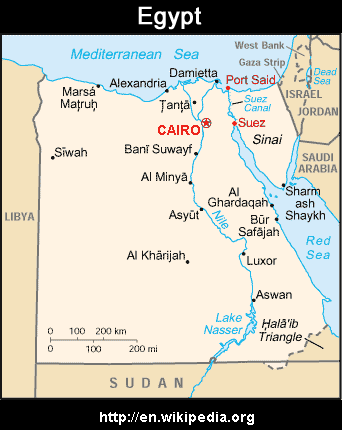The Arab Republic of Egypt, commonly known as Egypt, (Arabic: مصر, romanized Mişr or Maşr, in Egyptian dialect) is the most populous nation of northeastern Africa. Cairo (Arabic: القاهرة; romanized: al-Qāhirah) is the capital city of Egypt and has an estimated metropolitan area population of 16-20 million. It is the largest city in both Africa and the Middle East and is currently the eleventh most populous city in the world. Port Said is a northeastern Egyptian city near the Suez Canal, with an approx. population of 500,000. History : |
Mişr, the Arabic name for Egypt, is of Semitic origin, and possibly means 'a country' or 'a state'. The regularity and richness of the annual Nile River flood, coupled with semi-isolation provided by deserts to the east and west, allowed for the development of one of the world's great civilizations. A unified kingdom arose circa 3200 BC and a series of dynasties ruled in Egypt for the next three millennia. The last native dynasty fell to the Persians in 341 BC, who in turn were replaced by the Greeks, Romans, and Byzantines. |
|
Geography : ---------------------
. |
 |


